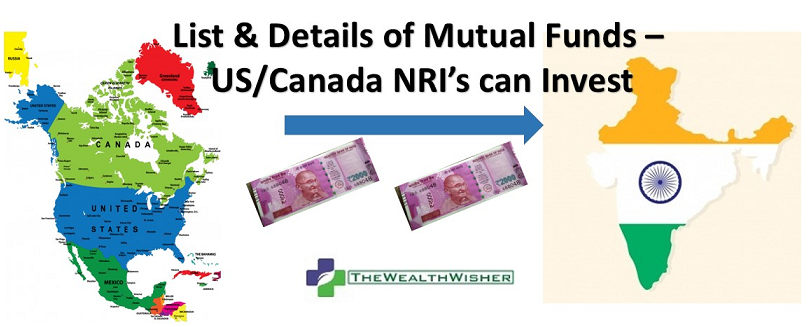Beware of the incomplete lists on the internet on “Can US Canada NRI invest in mutual funds?” Everyone seems to be confused around USA & Canadian NRI – if they can invest in Indian Mutual Funds or not? Let’s check the updated details – Can US-based NRI invest in mutual funds in India.
If you leave out SAARC countries, USA Dubai & Canada have maximum Visa’s issuances. Travelers keep visiting these countries. Many of them settle there for jobs & business. Many go decided that they will come back, many let it go on time to decide.
But the accumulation phase is limited. And, we all know savings do not make you wealthy – Investment Does. One of the options is Indian Equities.
Currency Risks: NRIs in the US may have options to invest in US-based Funds or Schemes in Dollars. But USD was around Rs 41 in 2008 and now (2019) is Rs 72. Would you like to invest by converting Indian Rs to USD and then redeeming after say 10 years when the Rupee has depreciated? This would be an unhappy situation if you prefer to come back to India after some years. So it is better to invest in Indian Rupee Based investments.
Option: You can invest directly or through mutual funds. Let’s discuss mutual funds today and leave direct equity for future explorations.
Complete Check List before becoming an NRI
First of all – Can US Canada NRI invest in Mutual Funds?
The answer is YES – subject to documentation.
This documentation can be general means applying to all NRIs. It can be specific also.
Specific for NRIs belonging to certain countries or specific documentation or conditions to be met as per Mutual Fund chose to invest.
Understanding NRI Accounts Repatriable TDS Rules
What about US & Canadian NRIs?
18 mutual funds allow USA & Canada (less than 18) based NRI to invest in their Mutual Fund schemes. The list is produced below.
List of Mutual Fund Companies that accept investments from NRIs based in US and Canada

Update 06 Aug 2019: DHFL Primerica Mutual Fund has stopped taking investments from US/Canadian Investors.
These mentioned AMC have different conditions to accept investments from the US or Canada based NRIs. Some accept investments only in paper application forms. Majority accept online application through transaction platforms (MFU, BSE Star MF & NSE NMF). Some Mutual Funds expects the investor to be in India when investment is made.
Aditya Birla Sunlife MF wants a declaration (on paper) for every transaction that you make. Even if you make the online investment the declarations have to be filed in physical paper form.
ICICI Prudential Mutual Fund wants physical presence for purchase & add purchase. No online transactions allowed.
SBI MF requires a one-time physical form application along with a declaration, the format of which is available on its website. Subsequently, you can invest online.
Sundaram MF, PPFAS MF, and L&T MF do not need any additional documentation. You can invest in any of their funds even using the online channel.
These rules may or may not change while making investments.
Repatriation
The investment can be on both repatriation or non-repatriation – as per FEMA (Foreign Exchange Management Act) Rules. If you want repatriation, it is better to invest using NRE a/c. If not you may use NRO a/c.
Specific Documentation
Some MFs have a specific declaration for NRI from US & Canada. These need to be filled while making investments. Also, FATCA is mandatory to be filled.
What if you are already investing and then attains NRI status for US & Canada?
If you as a resident is already investing in MFs mentioned in the list above and now acquiring NRI status for the USA or Canada, – You should not invest further. This means no additional purchase or SIP. You must request mutual fund to stop SIP. There is no need to withdraw immediately as you can redeem afterward as per requirement subject to reporting when you in US (NRI, Green Card or Citizen). Remember – None of the Mutual Fund Company forces/can force you to redeem your holdings. You may withdraw whenever you want them back.
Mutual Funds also stop or terminate further investment when you modify your KYC and status changes to NRI (US / Canada).
Further after settling in US/Canada, you may resume SIPs or investments in the funds of the above Mutual Fund companies.
Disclaimer: The information mentioned in this article “Can US Canada NRI invest in Mutual Funds” is based on our experience of managing portfolios for NRIs investors and our interactions with the Mutual Fund officials & MF platforms. It may change or modify. I request you to kindly confirm before investing.
Few More Relevant Articles You Might Want to Explore:








